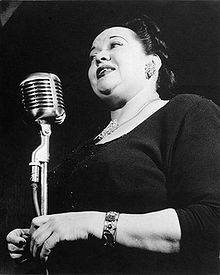- Mildred Bailey
-
Mildred Bailey 
Portrait of Mildred Bailey, Carnegie Hall (?), New York, ca. April 1947Background information Born February 27, 1907
Tekoa, Washington, Washington, United StatesDied December 12, 1951 (age 44)
Poughkeepsie, New York, United StatesGenres Jazz Occupations Singer Instruments Vocals Associated acts Red Norvo, Bing Crosby Mildred Bailey (February 27, 1907 – December 12, 1951) was a popular and influential American jazz singer during the 1930s, known as "The Rockin' Chair Lady" and "Mrs. Swing". Her number one hits were "Please Be Kind", "Darn That Dream", "Rockin' Chair" and "Says My Heart".
Contents
Biography
Born Mildred Rinker in Tekoa,[1] Washington, her mother, Josephine, was half Coeur d'Alene Indian and a devout Catholic.[2] Her father, Charles, played fiddle and called square dances. Her mother played piano every evening after supper and taught Mildred to play and sing. Her brothers were the vocalist and composer Al Rinker, and the lyricist Charles Rinker.
Career
At the age of seventeen, Bailey moved to Seattle and worked as a sheet music demonstrator at Woolworth's. She married and divorced Ted Bailey, keeping his last name because she thought it sounded more American than Rinker.[3] With the help of her second husband, Benny Stafford, she became an established blues and jazz singer on the West Coast. According to Gary Giddins' book Bing Crosby – A Pocketful of Dreams – The Early Years 1903-1940, in 1925 she secured work for her brother, Al Rinker, and his partner Bing Crosby. Giddins further states that Crosby first heard of Louis Armstrong and other Chicago black jazz records from Bailey's own record collection. Crosby helped Bailey in turn by introducing her to Paul Whiteman. She sang with Paul Whiteman's band from 1929 to 1933 (Whiteman had a popular radio program and when Bailey debuted with her version of "Moaning Low" in 1929, public reaction was immediate, although she did not start recording with Whiteman until late 1931).
Her first two records were as uncredited vocalist for an Eddie Lang Orchestra session in 1929 ("What Kind O' Man Is You?", an obscure Hoagy Carmichael song that was only issued in the UK) and a 1930 recording of "I Like To Do Things For You" for Frankie Trumbauer. She was Whiteman's popular female vocalist through 1932 (recording in a smooth crooning style), when she left the band due to salary disagreements. She then recorded a series of records for Brunswick in 1933 (accompanied by The Dorsey Brothers), as well an all-star session with Benny Goodman's studio band in 1934 that featured Coleman Hawkins.
In the mid 1930s, she recorded with her third husband Red Norvo. A dynamic couple, they earned the nicknames "Mr. and Mrs. Swing". During this period (1936–1939) Norvo recorded for Brunswick (with Bailey as primary vocalist) and Bailey recorded her own set of recordings for Vocalion, often with Norvo's band. Some of her recordings instead featured members of Count Basie's band. Despite her divorce from Norvo, she and Red would continue to record together until 1945. Suffering from diabetes and depression (during her adult life Bailey was overweight), she only made a few recordings following World War II.
Mildred Bailey died December 12, 1951, in Poughkeepsie, New York, of heart failure, aged 44, chiefly due to her diabetes. Her ashes were scattered. Red Norvo outlived Bailey by nearly half a century, dying in April 1999, a week after his 91st birthday.
Notable recordings
The following are some of Bailey's most well-known swing recordings
- "I'd Love To Take Orders From You" (1935)
- "Someday, Sweetheart" (1935)
- "When Day Is Done" (1935)
- "Honeysuckle Rose" (1935)
- "Squeeze Me" (1935)
- "'Long About Midnight" (1936)
- "Where Are You" (1937)
- "Rockin' Chair" (1937)
- "It's The Natural Thing To Do" (1937)
- "Bob White (Whatcha Gonna Swing Tonight?)" (1937)
- "Thanks for the Memory" (1938)
- "Please Be Kind" (1938)
- "Says My Heart" (1938)
- "Born To Swing" (1938)
- "Darn That Dream" (1939)
- "Love's A Necessary Thing" (1939)
- "I'm Glad There is You" (1939)
- "I Don't Stand a Ghost of a Chance with You" (1939)
- "The Lamp Is Low" (1939)
In 1939, Bailey fronted a six-side, mostly blues session as "Mildred Bailey and her Oxford Greys" for Vocalion, which featured a small mixed-race combo of Mary Lou Williams (piano), Floyd Smith (electric guitar), John Williams (bass) and Eddie Dougherty (drums).
Number one hits
In 1938, Bailey had two number one hits with Red Norvo. "Please Be Kind" was number one for two weeks. She also sang lead vocals on "Says My Heart" by Red Norvo and his Orchestra, which was number one for four weeks on the pop charts. "Says My Heart" reached number one during the week of June 18, 1938. Bailey sang lead vocals on "Darn That Dream", recorded by Benny Goodman and His Orchestra, which reached number one for one week in March, 1940 on the U.S. pop singles chart.
Honors
In 1989, Bailey was inducted into the Big Band and Jazz Hall of Fame.
References
- ^ "Mildred Bailey Biography". AllMusic.com. http://www.allmusic.com/artist/p6045/biography.
- ^ Giddins, Gary (January 2001). Bing Crosby: a pocketful of dreams : the early years, 1903-1940. Little, Brown and Company.. ISBN 0316881880.
- ^ Giddins, Gary (January 2001). Bing Crosby: a pocketful of dreams : the early years, 1903-1940. Little, Brown and Company.. ISBN 0316881880.
Bibliography
- The Complete Encyclopedia of Popular Music and Jazz 1900-1950 by Roger D. Kinkle (Arlington House Publishers, 1974)
External links
- "Twelve Essential Mildred Bailey Recordings" by Sue Russell, (Jazz.com)
- Allmusic
- Solid
Categories:- 1907 births
- 1951 deaths
- American jazz singers
- RCA Victor artists
- Savoy Records artists
- Vocalion Records artists
- Classic female blues singers
- Deaths from diabetes
- Deaths from heart failure
- People from Whitman County, Washington
- Torch singers
- Musicians from Washington (state)
Wikimedia Foundation. 2010.
